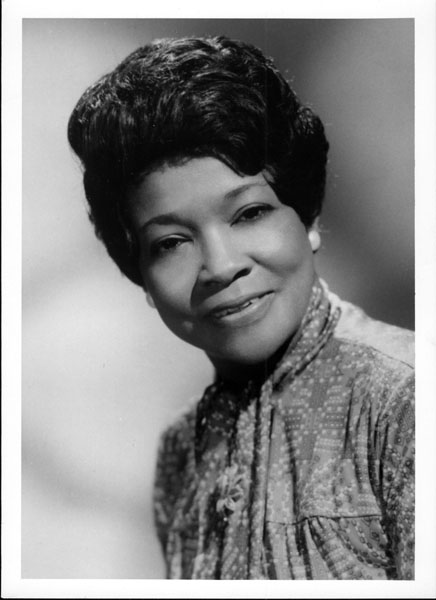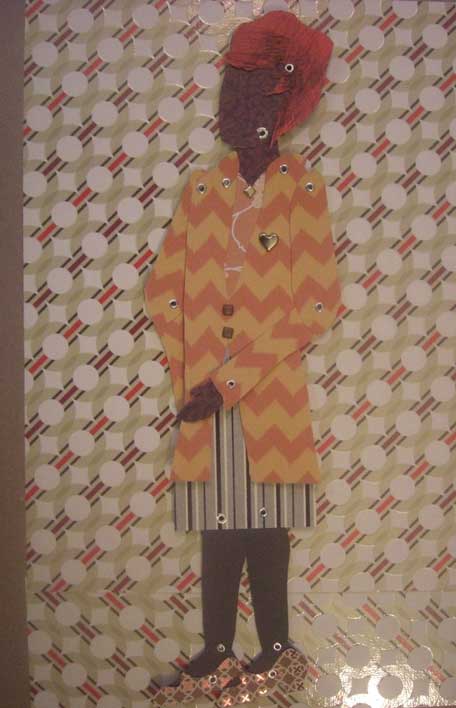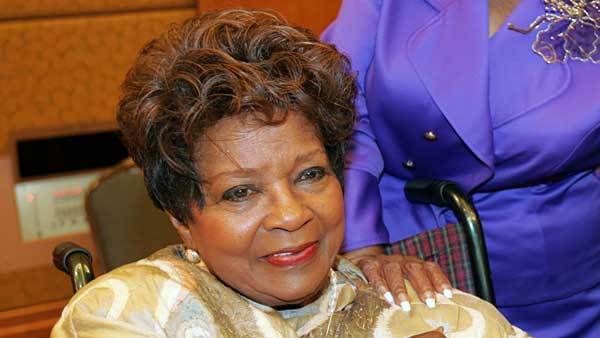'She Just Couldn't Take Injustice'
Remembering the Life and Legacy of Rev. Addie Wyatt
(March 28, 1924-March 28, 2012)
A pioneer in the labor movement, the civil rights movement and the women's equality movement, Addie Wyatt was born into poverty in Mississippi, and came to Chicago with her family during the depression. She married her sweetheart from DuSable High School, went to work in a meatpacking plant, and transformed lives.
In the Civil Rights Movement, Rev. Addie Wyatt was a leader, a force, the "power of one." She sang the gospel with Mahalia Jackson, marched from Selma to Montgomery with Dr. Martin Luther King Jr., and moved in the circles of power for decades. As the first black female international vice president of a major American labor union, she spent her life fighting gender and racial discrimination in the workplace.
In 1975, Time magazine named Wyatt one of its 12 women of the year and the first African-American woman to be so honored by the publication. She was also one of the original supporters of Operation Breadbasket, which later became Operation PUSH, and was selected by Eleanor Roosevelt to serve on President John F. Kennedy's Commission on the Status of Women.
On March 28, Rev. Wyatt died of an undisclosed illness two days after being admitted to Chicago's Advocate Trinity Hospital.
At the Vernon Park Church of God on Chicago's South Side, founded by Rev. Wyatt and her husband Claude Wyatt, the current pastor, the Rev. Jerald January, praised Rev. Wyatt's legacy to women: "I think the model she created for women--and men, but women particularly--through the National Organization for Women, through her civil rights work, through her church work particularly--all these different works--I think she set a template for women to follow."
Born in March 28, 1924, in Brookhaven, Miss., to Ambrose and Maggie Cameron, Addie was six years old in 1930 when her family moved to Chicago. After her mother died, Addie raised her siblings. In 1940, then-17-year-old Addie married Claude S. Wyatt Jr.; their union endured for 69 years, until April 2011 when Claude Wyatt passed away.
The Rev. Wyatt attended DuSable High School, where she learned to quietly but forcefully speak her mind, and went to church every Sunday, where she learned many of her guiding principles.
“She could give you a very radical speech about women’s rights . . . and all of her points of departure--no matter where she went--would start from Biblical stories, Biblical quotes,” said Michael Flug, a friend of the Rev. Wyatt’s who helped persuade her to donate a huge collection of papers, photos and tapes from her life to the Chicago Public Library.
Addie L. Wyatt, labor leader, activist for civil rights and women's rights, from ‘The Force of Ethics in Civil Rights,’ a project of the not-for profit Alliance of Ethics & Art, Inc.. As of 2011, this project included 150 interviews with unsung heroes of all races nationwide, conducted by journalist and Aesthetic Realism Associate Alice Bernstein, videotaped by photographer, David M. Bernstein. In this clip, Addie Wyatt talks about her civil rights breakthrough in the United Packinghouse Food and Allied Worker's Union.In 1941 17-year-old Addie applied for job as a typist at the Armour & Co. meat packing plant. She was not given the job, and later remembered: "They never intended to give it to me, I later found out, because they did not hire black typists in their front offices."
Instead, she was offered a job as a meatpacker, canning stews for the army.
She worked on the assembly line until about 1953 when the United Packinghouse Workers of America pulled her out of the plant to become a full-time union organizer.
At that time, many AFL-CIO-affiliated labor unions had clauses in their constitutions saying that blacks couldn't be members. Wyatt, along with labor organizer A. Philip Randolph, was among a group of people who started the Negro American Labor Council to fight for the rights of blacks to join unions and reap their rewards.
In the beginning, workers were unsure whether Wyatt could negotiate adequately on their behalf. Even management didn't take her seriously. But she fought to make sure that companies paid workers according to federal regulations and didn't force them to work excessive hours or under inhumane conditions.
Marcia Walker, a University of Chicago doctoral student who helped process the "Rev. Addie Wyatt and Rev. Claude Wyatt Papers," which opened in 2010 at the Chicago Public Library's Vivian G. Harsh Research Collection, said that when the meatpacking companies were shutting down or downsizing in the late 1950s, Wyatt negotiated with managers and workers to save some of the jobs of blacks and women, who were often the last hired and first fired.
"Rev. Wyatt would ask (company officials), 'How can we redefine the work structure to make sure not all blacks or women were getting laid off?'" Walker said.
"In one meatpacking plant all the women were fired and she sat down with male workers and said, 'It's not fair that we're losing women and I know you're worried about your jobs, but how can you assume some of that burden so they aren't all laid off?'"
Wyatt also encouraged women to become skilled in jobs that had been considered men's labor, such as butchering hogs.
A crocheted image of Rev. Addie L. Wyatt from a series honoring ‘The Transformers’ by Bridget McAlonan and available for purchase at her Inventing Trees website. Ms. McAlonan works at a rape crisis center as an educator and also as a squeaky wheel at the Sylvia Kania Gallery in Portland, Maine. Her online bio adds: ‘She continues to make delicate artwork…delicat like a brick wrapped in a lace dolly.’To Dr. Carol Adams, President and CEO of the DuSable Museum and a close friend of Rev. Wyatt's, the meat packing plant's snub changed the course of the young Addie's life. "So she became involved in the seamier side of the industry," Dr. Adams said. "Who knew what it was going to lead to? If she had gotten the typist position, perhaps she'd never have become a labor leader."
In short order Addie Wyatt was the union representative, working passionately for worker rights. By 1953 she was elected vice president of her local, representing workers as far away as Wisconsin, where she took a photo of striking meatpackers.
"I knew that I wanted to help other workers," Addie said, "and I found out that I could help them by joining with them and making the union strong and powerful enough to bring about change."
Eventually, she made union history.
"She became the international head of a labor union when women were not heads of labor unions much at all, nor African Americans," Adams said. "She wasn't a bystander, you know? She was an activist in the true sense of that word."
Wyatt was just as active in civil rights as she was in the labor movement, putting union money behind Dr. Martin Luther King's 1955 Montgomery bus boycott.
Rev. Jesse Jackson, co-founder of the Rainbow/PUSH Coalition, said "she and the late Congressman Charlie Hayes were amalgamated meat cutters. They took the first $10,000 down to Montogmery from Chicago. They were that involved, directly, in that struggle."
‘She wasn't a bystander, you know? She was an activist in the true sense of that word.’In the '60s, Wyatt and her husband invited Dr. King to Chicago, to lead a movement against segregated housing.
"I think she was envelope pusher, because she had a great sense of social justice. She wanted things to be right, and she was willing to work on that," Dr. Adams said. "As a very spiritual person, social justice was important to her. I think because of the moral and ethical relationships, because these things were right."
“I loved, respected, and appreciated her,” said former U.S. Senator Carol Mosely Braun in a statement. “She gave tirelessly of herself, her talent and her many gifts to promote the interests of working men and women, of the poor, of children and the powerless. She was a pioneer in the Labor Union movement, and opened doors for many who sought to make the trade unions more inclusive and democratic. She opened political doors through which many, including myself, entered corridors of power never before experienced by people of color, or by women. She was a civil rights warrior, whose support of Dr. Martin Luther King and his work not only in Chicago, but throughout the world, earned her his respect and the respect of the leadership of the ‘movement.’”
Rev. Wyatt's survivors include a son, Claude Wyatt III of Chicago, and a sister, Maude McKay, 74, the Rev. Wyatt's sole surviving sibling, who told the Chicago Sun-Times, "She always believed in being fair and honest, and she stood for what was right. She just couldn't take injustice."
Founder/Publisher/Editor: David McGee
Contributing Editors: Billy Altman, Laura Fissinger, Christopher Hill, Derk Richardson
Logo Design: John Mendelsohn (www.johnmendelsohn.com)
Website Design: Kieran McGee (www.kieranmcgee.com)
Staff Photographers: Audrey Harrod (Louisville, KY; www.flickr.com/audreyharrod), Alicia Zappier (New York)
E-mail: thebluegrassspecial@gmail.com
Mailing Address: David McGee, 201 W. 85 St.—5B, New York, NY 10024





